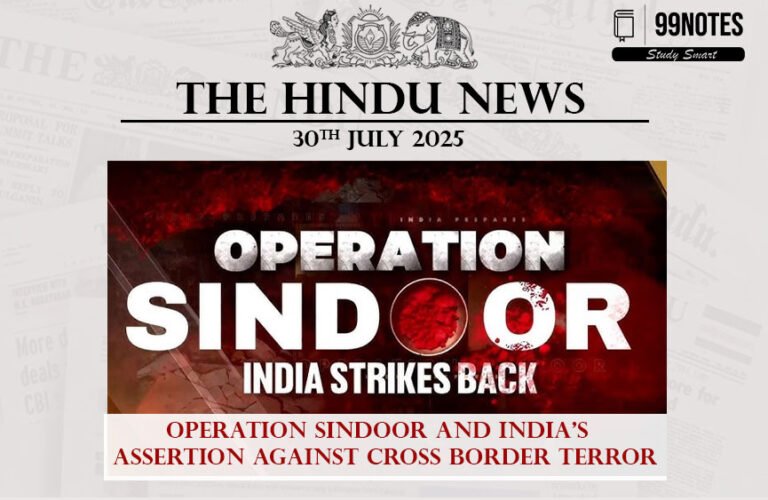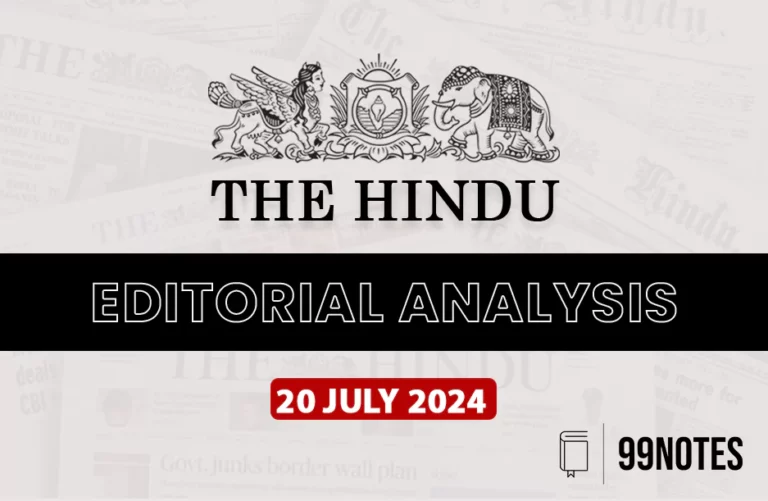17 January 2024 : The Hindu Editorial Notes PDF
The Hindu Editorial
17-January-2024
1. A provisional order by ICJ on Israel will cast shadow on legitimacy of its war.
| Topic: GS2 – International Relations – Important International institutions The South Africa-Israel case at ICJ sheds light on geopolitical tensions, genocide allegations, and global calls for Gaza ceasefire, relevant for UPSC aspirants. |
| Context: |
|
Background of the ICJ Hearing:
- The International Court of Justice (ICJ) at The Hague is currently holding a preliminary hearing on South Africa’s case against Israel’s military campaign in Gaza.
- The case has attracted global attention, standing out among other proceedings at this elite inter-state forum.
Historical Context of the Dispute:
- South Africa, having overcome its apartheid past, accuses Israel of practicing ‘apartheid’ against the Palestinian people for 75 years since 1948.
- Israel asserts it is acting in the interest of justice and humanity and vehemently denies any accusation of genocide.
Parallel Diplomatic Histories:
- Both countries experienced diplomatic isolation in the past century, with countries and sporting bodies boycotting them, yet they had the support of their western allies.
- Today, apart from a few allies, the entire world supports a ceasefire in Gaza to alleviate the suffering of its people.
South Africa’s Case at the Preliminary Stage:
- South Africa aims to demonstrate that some of Israel’s actions fall within the terms of the Genocide Convention, alleging ‘genocidal intent.’
- It relies on data regarding deaths, destruction, and the collapse of civilian life and health infrastructure in Gaza.
- Statements attributed to key Israeli government figures are highlighted as evidence of ‘genocidal intent.’
- Provisional measures sought include a suspension of military operations and steps to prevent genocide.
Israel’s Defense and Counterarguments:
- Israel characterizes the South African case as ‘blood libel’ but argues that its Gaza operations are a legitimate response to a terrorist attack on October 7 of the previous year.
- Israel downplays the relevance of its leaders’ statements, dismissing them as mere rhetoric.
- Civilian casualties are attributed to Hamas using civilians as shields and utilizing hospitals for storing explosives and launching pads for attacks.
Concerns About Compliance:
- The central issue before the court is straightforward, focusing on whether Israel will abide by any provisional measures.
- There is historical precedent, as Russia ignored an ICJ order to suspend its operations in Ukraine in March 2022.
- Despite any potential non-compliance, any provisional measure is likely to cast a shadow on the legitimacy of Israel’s Gaza war.
| More about International Court of Justice |
|
2. Status quo seems to suit Taiwan best in its relationship with China
| Topic: GS2 – International Relations UPSC relevance: Taiwan’s election dynamics, DPP’s win, and China tensions offer insights into geopolitics, democracy, and regional stability. |
| Context: |
|
Taiwan’s Presidential Election Results:
- Democratic Progressive Party (DPP) secures a historic third consecutive term in Taiwan’s presidential elections.
- Vice President William Lai Ching-te emerges victorious, reflecting 14 million voters’ preference for continuity and the status quo.
Message to the World and Beijing’s Response:
- Vice President Lai describes the elections as a global message affirming Taiwanese commitment to democracy.
- Beijing questions the DPP’s representation of mainstream public opinion, citing a reduced vote share for the ruling party.
Shift in Election Dynamics:
- While past elections reflected concerns about cross-strait relations, the latest polls prioritize local issues like the economy and jobs.
- Despite tensions with China, voters support DPP, signaling resistance to Beijing’s political and military pressures.
Continued Tensions and China’s Stance:
- Tensions persist with frequent military drills by China around Taiwan.
- China refuses to rule out force for “reunification,” but experts suggest economic consequences may deter such actions.
| China – Taiwan relations |
|
3. The geopolitics in the Bangladesh election results.
| Topic: GS2 – International Relations UPSC relevance: Bangladesh’s elections reveal geopolitical complexities, impacting regional dynamics, democratic values, and economic considerations, crucial for aspirants’ understanding. |
| Context: |
|
Bangladesh’s Controversial Elections:
- National elections on January 7, 2024, marked by violence and protests, result in a resounding victory for the ruling Awami League, securing 225 out of 300 contested seats.
- Bangladesh Nationalist Party (BNP) boycotts, demanding elections under a neutral caretaker government.
Geopolitical Dynamics:
- Bangladesh’s rising economic prominence attracts global powers like China, India, Russia, and the U.S., engaging in a geopolitical tug-of-war.
- India, with deep strategic interests, views a stable Bangladesh as crucial for balancing China’s influence.
U.S. Stance and Concerns:
- The U.S. criticizes Bangladesh for democratic shortcomings, human rights suppression, and press freedom restrictions.
- Balancing strategic interests and democratic values, the U.S. considers imposing visa restrictions on individuals undermining the democratic process.
China and Russia’s Responses:
- China, Bangladesh’s top trading partner, considers the election an internal matter and congratulates the Awami League on its victory.
- Russia, invested in Bangladesh’s infrastructure, aligns with China and congratulates Sheikh Hasina, emphasizing a collaborative relationship.
Economic Implications and Challenges:
- Bangladesh’s economic strength, with 7.1% GDP growth, becomes a geopolitical battleground.
- Potential U.S. and EU restrictions on the readymade garment industry, a significant foreign exchange source, pose challenges.
UN and Historical Precedent:
- Past UN warnings in 2007 resulted in a military-backed caretaker government holding elections in 2008.
- Uncertainty surrounds the UN’s response and potential actions following criticism of the 2024 elections.
Domestic Challenges:
- Surging living costs trigger protests amid challenges of dealing with energy import prices, dwindling dollar reserves, and a weakening local currency.
- Post-COVID recovery faces economic shocks, supply chain disruptions, and inflationary pressures, adding complexity for Prime Minister Hasina’s government.
Conclusion:
- The contentious Bangladesh elections showcase the nation’s geopolitical significance. As global powers weigh in, economic and strategic considerations intertwine, presenting challenges for the government in managing internal affairs while navigating complex international dynamics.
For Enquiry

17 Jan 2024 : Daily Quiz

17 Jan 2024 : Daily Answer Writing

17 Jan 2024 : Indian Express

17 January 2024 : The Hindu Editorial Notes PDF

17 Jan 2024 : PIB

17 Jan 2024 : Daily Current Affairs

Establishment of the British Rule in India: Timeline and Impact- Complete UPSC Notes

Advent of Europeans in India in Chronological Order- Complete UPSC Notes

State Information Commission UPSC Notes

Central Information Commission (CIC) in India- UPSC Notes
Daily Quiz 17 Jan 2024 : Daily Quiz 17 Jan 2024 : Daily Quiz…
mains answer writing 17 Jan 2024 : Daily Answer Writing Mains Answer Writing
17-January-2024
Q1) Globalization has been selective of social sections and economic…
Indian Express 17 Jan 2024 : Indian Express Indian Express
17- January-2023
1. Davos Man & Global South
Topic: GS2 – International Relations…
Jan 2024 The Hindu 17 January 2024 : The Hindu Editorial Notes PDF The Hindu Editorial
17-January-2024
1. A provisional order by ICJ on Israel will cast shadow on legitimacy…
Jan 2024 PIB 17 Jan 2024 : PIB PRESS INFORMATION BUREAU
17-January -2024
1.Shri Nitin Gadkari says Road Safety is top-most priority…
Daily Current Affairs 17 Jan 2024 : Daily Current Affairs Daily Current Affairs
17-January-2024
1. Expert Committee Proposes Overhaul of Defence Decision-Making:…
Modern India Establishment of the British Rule in India: Timeline and Impact- Complete UPSC Notes India before the British rule in India
Political scenario in India
The Mughals – After the death of…
Modern India Advent of Europeans in India in Chronological Order- Complete UPSC Notes Advent of Europeans in India
The history of modern India can be traced back to the advent of Europeans…
Statutory and non Statutory Bodies State Information Commission UPSC Notes State Information Commission
The Right to Information Act, 2005, besides the Central Information Commission,…
Statutory and non Statutory Bodies Central Information Commission (CIC) in India- UPSC Notes “Where a society has chosen to accept democracy as its creedal faith, it is elementary that the citizens…




